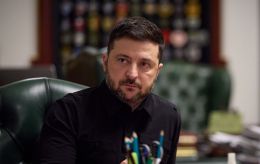Durov's arrest in France: What it means for Telegram
 Photo: Pavel Durov (facebook.com/durov)
Photo: Pavel Durov (facebook.com/durov)
Telegram founder Pavel Durov was detained by French authorities on the evening of August 24 on the runway at Le Bourget Airport, near Paris.
What is known about Durov’s arrest in France and what will happen to Telegram is detailed in this RBC-Ukraine report.
Sources: TF1 and BFMTV.
Durov’s detention
The 39-year-old businessman was detained after his private plane arrived in Paris from Azerbaijan.
Russian media reports that Durov was in Baku at the same time as Russian dictator Vladimir Putin, but it is unclear whether the Telegram founder met with him or anyone from his delegation.
At the time of his detention, Durov was accompanied by a bodyguard and a woman whose name has not been disclosed by journalists.
The French National Anti-Fraud Unit (DNLF) detained Durov because he was on a list of wanted individuals in France. An arrest warrant was issued by the country's judicial police as part of a “preliminary investigation,” details of which have not yet been released.
Durov was reportedly aware of the arrest warrant and had been trying to avoid visits to Europe. The reasons for his decision to come are unknown. French media note that the arrest warrant is only valid within France.
Charges against Durov
In France, Durov could face charges related to terrorism, drugs, fraud, money laundering, trafficking stolen goods, and sexual offenses against children.
These charges are linked to the lack of content moderation on Telegram and the messenger's refusal to cooperate with authorities.
French law enforcement considers Durov an accomplice in crimes committed via Telegram, due to the use of tools such as cryptocurrency and disposable numbers, and the lack of control over the platform.
Durov is expected to face formal charges on Sunday, August 25. The likelihood of release during the investigation is extremely low, as he has significant resources and opportunities for escape.
Possible sentence for Durov
It is currently unclear what sentence Durov might face. However, several Russian media outlets, including Izvestia, have reported that he could face up to 20 years in prison. This information was reportedly provided by French lawyer Alain Duflo, though his original statements on the matter are not clear.
History of Telegram
Telegram, a cross-platform messenger, offers features for text, voice, and video messaging, as well as audio and video calls, live broadcasts, and the creation of multi-user groups and channels.
The idea for Telegram originated with Durov during his work on the social network VKontakte. Active development began in 2012, and the official release of Telegram for iOS occurred in 2013, with the Android version following shortly after.
As of June 2022, Telegram was among the top five most downloaded apps worldwide, with over 700 million active users. By early 2023, according to founder Pavel Durov, Telegram had become the second most popular messenger in the world, behind only WhatsApp.
Sanctions against Telegram
Several media outlets, citing an unnamed source in the European Commission, report the possibility of sanctions against Telegram.
However, no French or other foreign media have reported any plans by the European Union to impose sanctions against Telegram.
Will Telegram be shut down?
The question of whether Telegram might close in connection with the arrest of its founder Pavel Durov is complex and multifaceted. Telegram is designed to be highly decentralized, meaning that even Durov’s arrest does not automatically mean the service will cease operations. Telegram has numerous servers around the world, and management is distributed among various individuals.
Laws on blocking messengers vary by country. In some states, banning Telegram would be much more difficult than in others. Additionally, blocking a large-scale messenger like Telegram is technically challenging, and users will always find ways to bypass such blocks.
However, partial blocking or increased control over the service in some countries cannot be ruled out.

